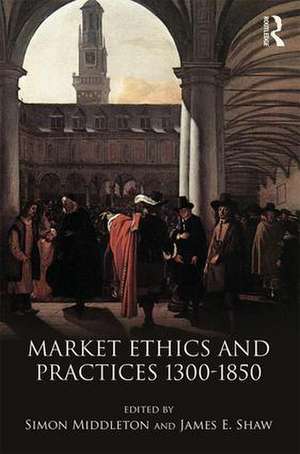Market Ethics and Practices, c.1300–1850
Editat de Simon Middleton, James E. Shawen Limba Engleză Paperback – 4 dec 2017
Divided into two parts, the first explores the principles and regulations of market ethics, such as the relations between professed norms and economic behaviour across a range of geographies and chronologies. The chapters consider key subjects such as medieval attitudes towards merchant activities across Europe, North Africa, and Asia; market regulations and the notion of the "common good"; Adam Smith’s conception of moral capitalism; and the combining of religious and capitalist ethics in Nat Turner’s "Confession." The second part provides microstudies that offer insights into topics such as household and market relations in colonial New England; the harsher side of the consumer economy experienced by a family of parasol sellers from Lyon; informal Jewish networks in the early modern Caribbean and slave trade; merchant networks and commercial litigation in eighteenth-century France; and early encounters and the informal norms of fur trading between Europeans and Native Americans.
This book provides an understanding of the key pre-modern economic historiography, whilst pointing students towards new debates and the historical significance for our collective economic future. It is ideal for students and postgraduates of late medieval and early modern economic history.
Preț: 365.87 lei
Nou
Puncte Express: 549
Preț estimativ în valută:
70.01€ • 72.95$ • 57.97£
70.01€ • 72.95$ • 57.97£
Carte tipărită la comandă
Livrare economică 03-17 aprilie
Preluare comenzi: 021 569.72.76
Specificații
ISBN-13: 9781138281578
ISBN-10: 1138281573
Pagini: 244
Ilustrații: 1 Tables, black and white; 2 Halftones, black and white
Dimensiuni: 156 x 234 x 22 mm
Greutate: 0.36 kg
Ediția:1
Editura: Taylor & Francis
Colecția Routledge
Locul publicării:Oxford, United Kingdom
ISBN-10: 1138281573
Pagini: 244
Ilustrații: 1 Tables, black and white; 2 Halftones, black and white
Dimensiuni: 156 x 234 x 22 mm
Greutate: 0.36 kg
Ediția:1
Editura: Taylor & Francis
Colecția Routledge
Locul publicării:Oxford, United Kingdom
Public țintă
Postgraduate and UndergraduateCuprins
Part I: Principles and regulations. 1. The ethics of arbitrage and forestalling across the late medieval world 2. Whose "common good"? Parisian market regulation, c. 1300–1800 3. Self-control and savings: Adam Smith and the creation of modern capital 4. Demonic ambiguities: Enchantment and disenchantment in Nat Turner’s Virginia Part II: Practices and microhistories. 5. Neighbours and hedges: Shopkeeping in early New England 6. Parasols and poverty: Conjugal marriage, global economy, and rethinking the consumer revolution 7. Trust in illicit markets: The role of Jewish merchants in Jamaica’s Spanish American trade 8. In union there was strength: The legal protection of eighteenth-century merchant partnerships in England and France 9. Commercial practices at the margins of the merchant economy 10."To winne them by fayre meanes": The ethics of exchange in the making of the early English Atlantic
Notă biografică
Simon Middleton (College of William and Mary) is author of From Privileges to Rights: Work and Politics in Colonial New York (2006) and co-editer of Class Matters (2008). He is working on a book investigating the introduction of paper money to colonial America.
James E. Shaw (University of Sheffield) is a historian who focuses on the relationship of legal structures (laws, practices, institutions) to the daily practices of economic life. His books include The Justice of Venice (2006) and Making and Marketing Medicines in Renaissance Florence (2011).
James E. Shaw (University of Sheffield) is a historian who focuses on the relationship of legal structures (laws, practices, institutions) to the daily practices of economic life. His books include The Justice of Venice (2006) and Making and Marketing Medicines in Renaissance Florence (2011).
Descriere
Market Ethics and Practices, c. 1300-1850 analyses the nature, development, and operation of market ethics in the context of social practices, from rituals of exchange and unofficial expectations to law, institutions, and formal regulations. It is ideal for students and postgraduates of late medieval and early modern economic history.
